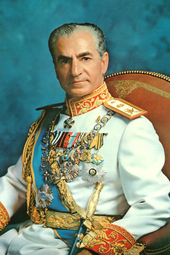- Shah
-
Shāh (Persian: شاه, [ʃɒː], English: /ˈʃɑː/) is the title of the ruler of certain Southwest Asian and Central Asian countries, especially Persia (modern Iran), and derives from the Persian word shah, meaning "king".
Contents
History
Shah or shahanshah ("King of Kings") was the title of Persian emperors or kings. It includes rulers of the first Persian Empire, the Achaemenid dynasty, who unified Persia and created a vast intercontinental empire, as well as rulers of succeeding dynasties. The title was also extensively used later by emperors of the Indian subcontinent, including those of the Mughal Empire. For instance, the third Mughal emperor, Akbar the Great (1542–1605), was formally known as "Shahanshah Akbar-e-Azam".
The full title of the Achaemenid rulers was Kshatriya Kshatriyanamah, "King of Kings" in Old Persian, corresponding to Middle Persian šāhān šāh, literally "kings' king", and Modern Persian shāhanshāh (شاهنشاه). In Greek, this phrase was translated as "βασιλεύς τῶν βασιλέων (basileus tōn basiléōn)", "king of kings", equivalent to emperor. Both terms were often shortened to their roots: shah and basileus.
In Western languages, shah is often used as an imprecise rendering of shāhanshāh. The term was first recorded in English in 1564 as a title for the king of Persia, with the spelling "Shaw". For a long time, Europeans thought of shah as a particular royal title rather than an imperial one, although the monarchs of Persia regarded themselves as emperors of the Persian Empire (later the Empire of Iran). The European opinion changed in the Napoleonic era, when Persia was an ally of the Western powers eager to make the Ottoman Sultan release his hold on various (mainly Christian) European parts of the Ottoman Empire, and western (Christian) emperors had obtained the Ottoman acknowledgement that their western imperial styles were to be rendered in Turkish as padishah.
The last shah of Persia, Mohammad Reza Shah Pahlavi, officially adopted the title شاهنشاه shâhanshâh (literally King of Kings) and, in western languages, the rendering as "Emperor". He also styled his wife شهبانو shahbânu (empress).
Ruler styles
- The title padishah (Great King) was also adopted from the Iranians by the Ottomans, and by various other Islamic monarchs claiming imperial rank, such as the Indian Mughals.
- Another subsidiary style of the Ottoman sultan khan was Shah-i-Alam Panah, meaning "King, refuge of the world".
- Some monarchs were known by a contraction of the kingdom's name with shah, such as Khwarezmshah, ruler of the short-lived Muslim realm of Khwarezmia, or the more modest Azeri Shirvanshah of Shirvan (later a modest khanate).
- The kings of Georgia called themselves shahanshah. The last such monarch was Irakli II, who in 1783 adopted Russified titles instead, due to the influence of imperial Russia.
Shahzada
Shahzada (Persian شاهزاده Šāhzādé). In the realm of a shah (or a more lofty derived ruler style), a prince of the blood was logically called shahzada as the term is derived from shah using the Persian patronymic suffix -zāde or -zāda, "son, descendant"; it also means a Gujarati prince. However the precise full styles can differ in the court traditions of each shah's kingdom. Female descendants or princesses are called Shahzadi.
Thus, in Oudh, only sons of the sovereign shah bahadur (see above) were by birth-right styled "Shahzada [personal title] Mirza [personal name] Bahadur", though this style could also be extended to individual grandsons and even further relatives. Other male descendants of the sovereign, in the male line were merely styled "Mirza [personal name]" or "[personal name] Mirza". This could even apply to non-Muslim dynasties. For example, the younger sons of the ruling Sikh maharaja of Punjab were styled "Shahzada [personal name] Singh Bahadur".
The corruption shahajada, "Shah's son", taken from the Mughal title Shahzada, is the usual princely title borne by the grandsons and male descendants of a Nepalese sovereign, in the male line.
For the heir to a "Persian-style" shah's royal throne, more specific titles were used, containing the key element Vali Ahad, usually in addition to shahzada, where his junior siblings enjoyed this style.[clarification needed]
Other styles
- Shahbanu (Persian شهبانو, Šahbānū): Persian term using the word Shah and the Perian suffix -banu ("lady"): Empress, in modern times, the official title of Empress Farah Pahlavi.
- Shahdokht (Persian شاهدخت Šāhdoxt) is also another term derived from shah using the Persian patronymic suffix -dokht "daughter, female descendant", to address the Princess of the imperial households.
Related terms
- Shah is a widespread name in Iran and the Indian subcontinent. See Shah (surname).
- Satrap, the term in Western languages for a governor of a Persian province, is a distortion of xšaθrapāvan, literally "guardian of the realm", which derives from the word xšaθra, an Old Persian word meaning "realm, province" and related etymologically to shah.
- Maq'ad-i-Shah (Persian مقعد شاه Maq'ad-i-Shah), the phrase from which the name of Mogadishu is believed to be derived, which means "The seat of the Shah", a reflection of the city's early Persian influence.[1]
- Chess and the chess term check in Western languages are derived from shah, transmitted through Arabic.
References
- ^ David D. Laitin, Said S. Samatar, Somalia: Nation in Search of a State, (Westview Press: 1987), p. 12.
External links
Categories:- Heads of state
- Royal titles
- Noble titles
- Persian loanwords
- Titles of national or ethnic leadership
- Titles in Iran
- Titles in Pakistan
Wikimedia Foundation. 2010.


